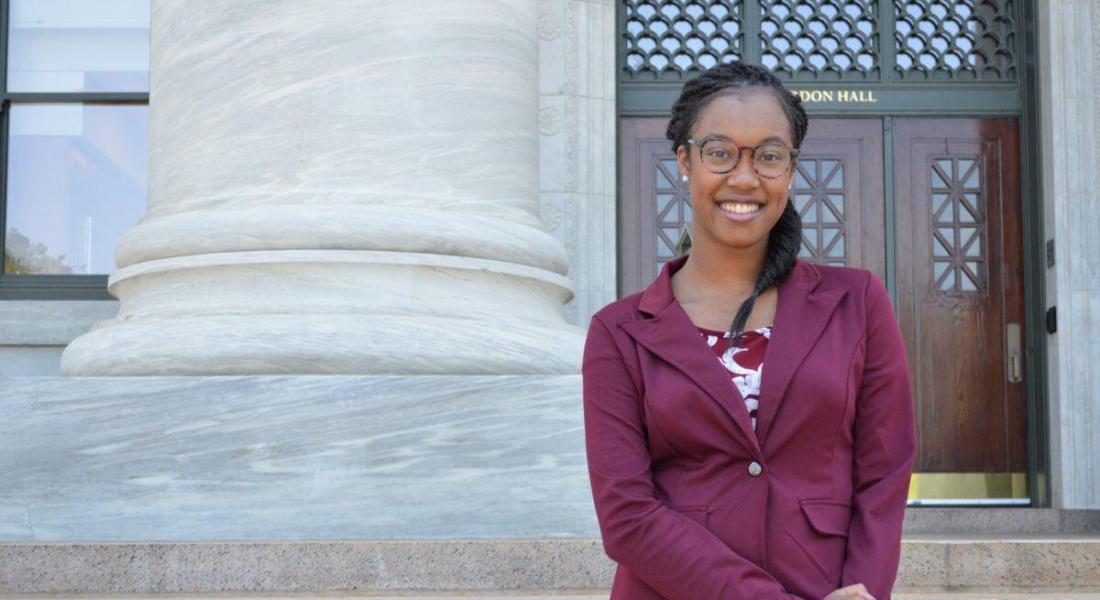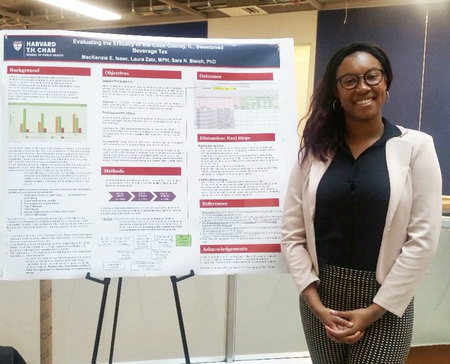
Kellogg International Scholar MacKenzie Isaac ’20 knew she wanted to improve her Spanish skills at Notre Dame. But to be truly fluent, she needed to learn more than the language.
“Fluency isn’t just being able to go abroad and sound competent and sophisticated in your use of language,” she said. “It’s also having a deep cultural understanding of what's going on.”
The junior sociology and Latino studies major is using her studies to pursue her interest in health, with a focus on the social factors that cause health problems.
Through the Kellogg Institute’s International Scholars Program, she’s researching issues connected to the Caribbean diaspora, colorism, health, and more.
Faculty Fellow Karen Richman, director of undergraduate studies at the Institute for Latino Studies and her ISP faculty mentor, is advising Isaac as she plans her senior thesis on skin-lightening among Haitian migrants in the Dominican Republic.
“I enjoy taking interdisciplinary courses that allow me to learn about current issues, triumphs, and events within Latinidad because more than ever, these things are featured in everyday, public conversation,” Isaac said. “America's Latinx community is not only the fastest-growing, not only the youngest, but it is also one of the most influential in shaping our political rhetoric, our discussions of faith, and our workforce.”
Isaac’s focus on cultural understanding drew her to the ILS, where she’s found academic inspiration, research support, and a welcoming community.
“ILS is so much more than an academic institute,” she said. “It is a platform for Latinx — and other marginalized — voices to be elevated. It is where some of the most powerful acts of solidarity emerge on this campus.”
Isaac is minoring in data science, helping her develop skills in analyzing and comprehending big data that can enhance her understanding of social theories and factors.
“The thing that I love the most about my sociology degree in particular, and the social sciences in general, is that there's really no privileging of the qualitative over the quantitative and vice versa,” Isaac said. “It all blends together really well.”
Both the qualitative and quantitative skills that Isaac has gained from her education have aided her in research opportunities. After her freshman year, Isaac participated in a Harvard School of Public Health summer research program called Fostering Advancement & Careers through Enrichment Training in Science (FACETS).
 Working under the guidance of Harvard professor Sara Bleich, Isaac was able to research and study the social factors that influence childhood obesity, and in turn how childhood obesity affects the rest of a person’s life. Isaac and Bleich then worked on how to disseminate this information to the public in ways that promote social change.
Working under the guidance of Harvard professor Sara Bleich, Isaac was able to research and study the social factors that influence childhood obesity, and in turn how childhood obesity affects the rest of a person’s life. Isaac and Bleich then worked on how to disseminate this information to the public in ways that promote social change.
Isaac kept in touch with Bleich throughout her sophomore year and returned to the FACETS program for a second summer. The experience, she said, helped her discover her passion for academia – both research and teaching – as she combined her interests in health care and sociology with a desire to pursue social justice.
“To say that that experience was completely transformative in how I viewed myself and how to apply my calling would actually be an understatement,” Isaac said.
After Notre Dame, she hopes to earn a doctorate in public health, then teach and research in social and behavioral sciences or health policy.
Isaac has explored her interest in public health on campus, including working with the Architecture, Health, and Sustainability research group run by Kim Rollings, an assistant professor of architecture and psychology, to study how physical environments affect health practices.
Currently, the group is creating an app called CAFES (the Cafeteria Assessment for Elementary Schools) that examines how factors like the arrangement of food and seating can affect food choices and interaction during school lunch periods.
Isaac’s research on campus and beyond has only served to reinforce the foundation of her liberal arts education.
Though at times, much of her research can consist of tedious data coding, she said the inspiration to keep working comes from her sense of duty to give back to the world, something that she says makes a Notre Dame liberal arts education unique.
“Amidst all of the numbers, all the formulas and equations, the College of Arts and Letters is always there to remind you that there is a narrative behind each and every one of those, and that narrative is somehow intertwined with yours,” she said. “And that gives you a sense of civic and communal responsibility for promoting the well-being of others, for dedicating your life in service to others, that I don’t think I would get anywhere else.”
Originally posted at al.nd.edu





